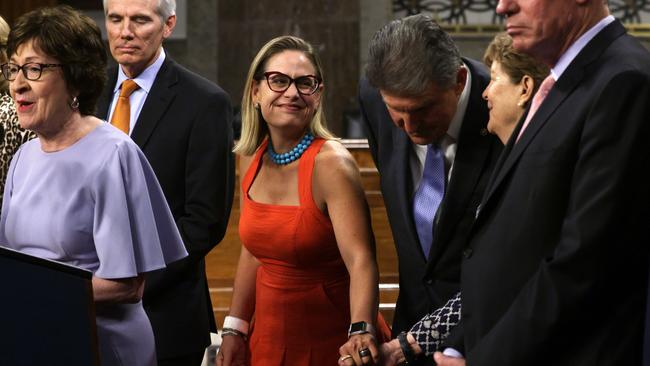Senate clears way for Joe Biden’s build bill
$1.36 trillion deal to improve US road, rail and public transport infrastructure, clears first procedural hurdle in 67-32 vote.

Joe Biden scored a major political win on Thursday AEST as the US Senate voted for a landmark bipartisan deal worth at least $US1 trillion ($1.36 trillion) to improve the nation’s road, rail, internet and public transport infrastructure.
After five weeks of negotiation the US Senate voted 67-32, more than the 60 votes required, to advance a deal that the US President called “the most significant long-term investment in our infrastructure and competitiveness in nearly a century”.
“It is the most important investment in rail since the creation of Amtrak 50 years ago. It will deliver high-speed internet to every American,” Mr Biden said. “The Bipartisan Infrastructure Deal is a blue-collar blueprint to rebuild America that will help make our historic economic recovery a historic long-term boom.”
A bipartisan group of 10 senators had been working for weeks towards an agreement on the details of the framework for fresh spending on roads, bridges, water infrastructure and broadband access, among other measures, that had been held up by disagreement over how to pay for it.
Republican negotiators said they now had enough confidence in the details of the agreement to allow it to move forward. Senate minority leader Mitch McConnell backed the motion.
“Despite the popularity and the need for it, Washington hasn’t been able to get it done. This time, we’re going to get it done,” said Rob Portman, the lead Republican negotiator in the talks.
Veteran Democrat congressman from Connecticut Joe Courtney, speaking a few hours before the Senate vote, said the deal was “spiritually, morally” critical for the US in the wake of intense partisan rancour during the previous administration of Donald Trump.
“It’s important for the country to see that we can get a bipartisan package through,” he told The Australian.
The infrastructure agreement is expected to include $US110bn for improvements to roads and bridges and $39bn in new funding to modernise public transit and replace thousands of buses with zero-emission vehicles, according to Senate and White House summaries.
“This deal signals to the world that our democracy can function, deliver, and do big things,” Mr Biden said. “As we did with the transcontinental railroad and the interstate highway, we will once again transform America and propel us into the future.”
The legislation will also allot $66bn for passenger and freight rail systems, including Amtrak, as well as $7.5bn to build a national network of electric-vehicle charging stations.
“We still have a long way to go before we get to the finish line, but this was a vitally important first step,” said senator Susan Collins, one of the Republican senators who helped broker the deal.
At the same time congressional Democrats, many of whom consider the bipartisan agreement a “20th century deal” because of its traditional focus on road and rail infrastructure, seek to pass a more controversial and expensive bill, worth upwards of $3.5 trillion, without Republican support.
“My goal remains to pass both the bipartisan infrastructure bill and a budget resolution during this work period – both,” said Senate majority leader Chuck Schumer after the vote. “We are going to get the job done. And we are on track.”
The additional bill, opposed by Republicans and potentially some moderate Democrats who face re-election in the 2022 mid-term congressional elections, would provide subsidies to electric cars, expand Medicare coverage to include vision, dental and hearing services, and expand social and environmental programs.
All 50 Democrat senators will need to support the bill in the 100-seat upper house for the separate bill to succeed.
Both infrastructure proposals come amid growing concern about rising consumer price inflation, which has risen to 5.4 per cent over the year to June, the fastest pace since 2008, and well above the Federal Reserve’s inflation target of 2 per cent.
“We’re going to do it without raising taxes by one cent on people making less than $400,000 a year — no gas tax increase and no fee on electric vehicles,” the President said of the bipartisan deal.
The package still faces a long road to becoming law.
Having cleared this first procedural hurdle, politicians need to navigate a potentially lengthy amendment process while maintaining a bipartisan coalition that faces pressures from conservatives and progressives.




To join the conversation, please log in. Don't have an account? Register
Join the conversation, you are commenting as Logout